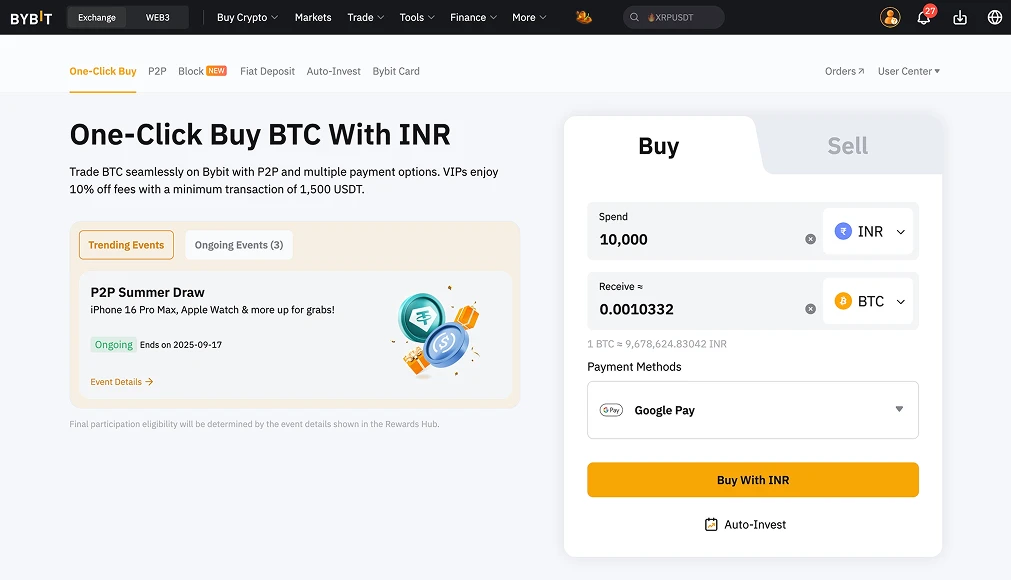How to Buy Crypto with UPI Transfer

Summary: Indian investors interested in cryptocurrencies can conveniently use UPI transfers to deposit funds into crypto exchanges approved by the Reserve Bank of India (RBI), such as Bybit, Binance, or OKX.
Investors are strongly advised to use regulated digital asset platforms to ensure compliant crypto transactions through the UPI payment method.
Bybit is the best platform for UPI in India due to its regulatory compliance, user-friendly interface, and support for free INR deposits, providing access to spot and futures trading.
Available Cryptos
2,000+ Cryptocurrencies
Trading Fees
0.1% Spot Trading Fee
INR Deposit Methods
Bank Transfers, UPI, Paytm, Cards
Can I Buy Bitcoin with UPI Transfer?
Unified Payments Interface (UPI) is the most commonly used payment method in India, and residents can use it to deposit Indian Rupees (INR) into RBI-compliant digital asset investment platforms.
Investors can instantly transfer funds with UPI to regulated Indian crypto exchanges. Deposits through UPI payments are swift, reliable, and widely accepted, allowing users a simple pathway to trade Bitcoin and other digital assets safely within India's regulatory framework.
How to Buy Crypto with UPI
Indian investors looking to purchase cryptocurrencies can deposit funds using UPI transfers into trusted exchanges compliant with the Reserve Bank of India (RBI) regulations.
Bybit is India's leading exchange, registered with the Financial Intelligence Unit (FIU). Indian traders can deposit INR using UPI and access over 2,000 cryptocurrencies for spot and futures trading.
Here is a straightforward guide to buying crypto with UPI transfers on Bybit:
- Register: Visit Bybit's official site to set up your user profile. Complete the mandatory Know Your Customer (KYC) checks, as required under Indian financial regulations.
- Deposit INR: After verifying your account, navigate to the 'Buy Crypto' section and select UPI as your deposit option. Enter the amount of INR you wish to add and authorize the payment via your chosen UPI app.
- Choose Crypto: Explore Bybit's selection of digital assets and pick the cryptocurrency you'd like to buy.
- Complete Purchase: Enter your desired investment amount in INR, carefully verify transaction details, and confirm your crypto acquisition. Your digital assets will then securely appear in your exchange wallet.

Alternative Crypto Exchanges for UPI Transfers
Indian investors looking to purchase digital assets via UPI transfers have several exchanges to choose from. Each platform supports seamless INR deposits via UPI, enabling fast crypto investments:
- Gate.io: Gate.io supports direct UPI deposits in INR, offering investors a selection of over 3,600 cryptocurrencies. The platform maintains clear transaction fees of 0.1%.
- Binance: Binance accepts INR deposits via UPI, providing investors access to more than 350 cryptocurrencies. Users benefit from transparent trading fees starting at 0.1%.
- KuCoin: KuCoin allows deposits in INR through UPI transfers. The exchange offers a broad selection of approximately 700 crypto assets, along with clear trading fees at 0.1% per trade.
When choosing a crypto exchange, investors depositing via UPI should carefully evaluate critical factors, including supported cryptocurrencies, ease, and speed of INR deposits, trading costs, and the overall security of each platform.
About UPI Transfers
Unified Payments Interface (UPI) is India's real-time digital payment system, developed by the National Payments Corporation of India (NPCI) and launched in April 2016. It enables instant money transfers between bank accounts through mobile applications, using a unique UPI ID or Virtual Payment Address (VPA).
UPI supports various transaction types, including peer-to-peer transfers, bill payments, and online purchases. Its interoperability across banks and payment apps, coupled with features like QR code scanning and two-factor authentication, ensures secure and convenient transactions.
.webp)
Final Thoughts
Using UPI transfers provides Indian investors with a secure and efficient route to cryptocurrency investing, streamlining deposits into RBI-compliant exchanges like Bybit.
To maximize your investment safety and success, always select regulated platforms, carefully compare their crypto offerings, fees, and security features, and stay updated on India's regulatory landscape.
Frequently asked questions
How secure is it to use UPI for crypto transactions?
UPI employs multi-factor authentication, including device binding and UPI PINs, to ensure transaction security. To enhance safety, users should download UPI apps only from official app stores, regularly update their apps, and monitor account activity for any unauthorized transactions.
Is KYC mandatory for buying crypto with UPI in India?
Yes, completing Know Your Customer (KYC) verification is mandatory when using UPI to deposit INR into crypto exchanges. This process typically involves submitting identification documents such as a PAN card or Aadhaar card and is required to comply with the Prevention of Money Laundering Act (PMLA).
Are there any fees for using UPI to deposit INR into crypto exchanges?
Typically, UPI transactions are free for peer-to-peer transfers. However, certain merchant transactions, especially those involving prepaid payment instruments (PPIs) like wallets, may incur an interchange fee of up to 1.1% for amounts exceeding ₹2,000. It's important to check with your chosen crypto exchange and payment provider for any applicable fees.
Are there transaction limits when depositing funds with UPI into crypto exchanges?
Yes, transaction limits apply based on your UPI app and bank’s daily or per-transaction policies. Commonly, the daily limit ranges from ₹50,000 to ₹1,00,000. Investors should verify these limits with their specific bank or payment provider.

Written by
Jed Barker
Editor-in-Chief
Jed, a digital asset analyst since 2015, founded Datawallet to simplify crypto and decentralized finance. His background includes research roles in leading publications and a venture firm, reflecting his commitment to making complex financial concepts accessible.





.webp)




